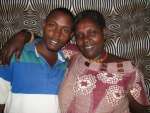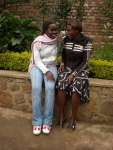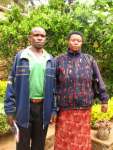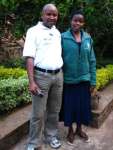Mukandagijimava Epiphanie & Muhongwanseko Scholastique
Mother and daughter open up to each other about love, loss, and marriage. The two women discuss many topics including religion, intimate relationships, and how dating practices have changed over time. Muhongwanseck Scholastique shares her concerns about her future with her mother Mukandagijimava Epiphanie, and asks about the secret to her parent’s good marriage. Mukandagijimava Epiphanie welcomes her daughter’s questions and says that relationships should be based on love, respect, and communication.
Uwamwezi Philomene & Dusabe Nicole
Uwamwezi Philomene talks to Nicole about the difficulties parents face when talking to their children, and how people today can manage busy schedules to remember the past. Dusabe Nicole also wonders about how they can regain trust and love in society when certain people are known to have been murderers, and Uwamwezi Philomene counsels her in love.
Mukangiruwonsanga Agnes & Ntamitondero Muneza Yves
Mukangiruwnsanga Agnes talks to Ntamitondero Muneza Yves about the history of his own name because he has been ashamed of it, and how their personal history and Rwandan history have shaped the naming of youths. She also shares her personal story growing up as one of ten children, and counsels Ntamitondero Muneza Yves on how to be a useful and meaningful member of society for a better future, with tips from learning to keep secrets, to developing a culture of peace.
Nyirasafari Leocadie & Mukiza Emmanuel
Mukiza Emmanuel has many questions for his mother, Nyirasafari Leocadie, about her life before and after the war. Nyirasafari Leocadie describes her schooling, marriage, and raising children, and the hardships the family faced while living in exile. Mukiza Emmanuel is also eager to hear stories about his father and the grandfathers he never knew. Nyirasafari Leocadie tells him the lessons she learned from her father.
“During the war, I was then young. I would like to know about life during the war.” Mukiza Emmanuel
Munganyinka Melaine & Murebwayire Marie Claire
Munganyinka Melaine lived in a time when girls were restricted to house duties, no education, and general strictness which boys were not subject to. Girls would stay home and make butter, weave, and take care of kids. Women could have fun too, but it all took place within the strict confines of the old Rwandan culture and way of life.
Urayeneza Sauda & Mugwaneza Noella
In the days of Mugwaneza Noella’s grandparents, children remained naked until they were the age of 10, at which point they would be clothed with dressed skin leather. Mugwaneza Noella and her aunt, Urayeneza Sauda, discuss the differences between the past and present culture and how it has affected the youth of today.
“Did your mother never help you or tell your brother to help you? Could your brothers plead for you so that you may go to school?” Mugwaneza Noella
Uwamahoro Ernestine & Uwimana Deogratias
Uwimana Deogratias is curious about the level of education in Rwanda, and he hopes his elder, Uwamahoro Ernestine, can give him more knowledge on the topic. He was concerned with how uneducated the older generation is, so Uwamahoro Ernestine explains how difficult it was to study during her youth. Comparing the days of her youth when it was rare to see anyone pass their education to today when even those with university degrees may not be guaranteed employment, the times have changed immensely.
Nyiransabimana Verene & Muhoza Desire
As the son of Nyiransabimana Verene, Muhoza Desire is curious about his mother’s past with his father. She is especially curious because Muhoza Desire grew up without his father. He passed away shortly after he was born. Nyiransabimana Verene loved her husband, and they became newlyweds when she was only seventeen. However, her beloved became sick with malaria and passed away when Muhoza Desire was only 5 or 6 years of age. Despite this, she continued to stay strong and raise her three children.
Ntibanyendera Elissam & Muhawenimana Genevieve
As a young woman, Muhawenimana Genevieve has burning questions concerning the way life was in the time of her elders. She invites her uncle to help her answer these questions. The Rwanda of today is far removed from the Rwanda of the past, as Muhawenimana Genevieve discovers. Families and the land they owned used to be large, and money did not even exist. Instead, life depended on one’s resources such as livestock and property. She asks about the shift in norms for boys and girls such as the issue of HIV/AIDS and rebelliousness in today’s youth.
Zimulinda Pheneas & Shingiro Remy
Full of questions concerning the history of religion in Rwanda and how Rwandan culture of the past differs from that of today, Shingiro Remy listens intently to the words of Zimulinda Pheneas, his counselor. Zimulinda Pheneas discusses the origins of churches in Rwanda, the issues of teen pregnancy and drug abuse, how children were traumatized even without going through the genocide, the effect of good parenting and community parenting, and his philosophy on education. He goes into detail on such subjects as rape, gendered violence, and prostitution.










